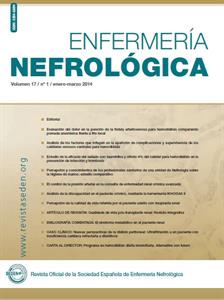Contenido del artículo principal
Resumen
La percepción personal de un individuo de su situación de vida, dentro del contexto cultural y de valores en el que vive, y en relación con sus objetivos, expectativas, valores e intereses, se denomina, calidad de vida.
Como en estudios de pacientes crónicos, los factores más influyentes en la percepción de la calidad de vida, se
clasifican en: paciente, medicamento, enfermedad y calidad de la interacción entre paciente y sistema sanitario.
Objetivos:
Describir la percepción que tienen los pacientes sobre su calidad de vida, e identifi car factores que infl uyen en esta percepción.
Material y métodos:
Estudio descriptivo transversal en pacientes adultos, con trasplante renal, que acuden a nuestra consulta hospitalaria y son autosufi cientes en el tratamiento.
Todos los pacientes han recibido charlas grupales sobre el manejo de su tratamiento antes del alta.
Recogida de datos con cuestionario anónimo autoadministrado:
Escala validada: cuestionario de salud SF-12 (versión 2), durante 4 meses.
Se excluyeron pacientes que rechazaron participar y que necesitaban ayuda en el manejo del tratamiento. Se estimó
un tamaño muestral de 222 pacientes. Variables dependientes: Calidad de vida. Variables independientes:
Factores socio-demográfi cos, tipo inmunosupresores, educación sanitaria recibida por profesionales de la salud.
Se solicitó consentimiento informado y se obtuvo informe favorable del Comité Ético de Investigación Clínica.
Resultados:
Participaron 209 pacientes. Edad media 55,2(±12,15) rango 21-80 años, siendo el 61,8 % hombres. El 42%
eran jubilados, el 38,2% tenían estudios secundarios, el 71% convivían en pareja.
El inmunosupresor más utilizado: Micofenolato de sodio (MYFORTIC®) (65,5%) y el 46,7% tomaban dos inmunosupresores.
La información sanitaria sobre efectos secundarios la consideran insuficiente un 20,5%.
La media de la percepción de la calidad de vida es de 44,72±8,11 para el componente físico y 47,47±8,8 para el componente mental.
Discusión:
Los pacientes que llevan menos tiempo trasplantados refieren una mejor percepción de la calidad de vida.
Debemos tomar medidas de mejora en la educación sanitaria sobre efectos adversos.
Las charlas grupales informativas antes del alta del paciente creemos que han sido efectivas para la mejora
del cumplimiento del tratamiento y en consecuencia para la mejora de su calidad de vida.
Como en estudios de pacientes crónicos, los factores más influyentes en la percepción de la calidad de vida, se
clasifican en: paciente, medicamento, enfermedad y calidad de la interacción entre paciente y sistema sanitario.
Objetivos:
Describir la percepción que tienen los pacientes sobre su calidad de vida, e identifi car factores que infl uyen en esta percepción.
Material y métodos:
Estudio descriptivo transversal en pacientes adultos, con trasplante renal, que acuden a nuestra consulta hospitalaria y son autosufi cientes en el tratamiento.
Todos los pacientes han recibido charlas grupales sobre el manejo de su tratamiento antes del alta.
Recogida de datos con cuestionario anónimo autoadministrado:
Escala validada: cuestionario de salud SF-12 (versión 2), durante 4 meses.
Se excluyeron pacientes que rechazaron participar y que necesitaban ayuda en el manejo del tratamiento. Se estimó
un tamaño muestral de 222 pacientes. Variables dependientes: Calidad de vida. Variables independientes:
Factores socio-demográfi cos, tipo inmunosupresores, educación sanitaria recibida por profesionales de la salud.
Se solicitó consentimiento informado y se obtuvo informe favorable del Comité Ético de Investigación Clínica.
Resultados:
Participaron 209 pacientes. Edad media 55,2(±12,15) rango 21-80 años, siendo el 61,8 % hombres. El 42%
eran jubilados, el 38,2% tenían estudios secundarios, el 71% convivían en pareja.
El inmunosupresor más utilizado: Micofenolato de sodio (MYFORTIC®) (65,5%) y el 46,7% tomaban dos inmunosupresores.
La información sanitaria sobre efectos secundarios la consideran insuficiente un 20,5%.
La media de la percepción de la calidad de vida es de 44,72±8,11 para el componente físico y 47,47±8,8 para el componente mental.
Discusión:
Los pacientes que llevan menos tiempo trasplantados refieren una mejor percepción de la calidad de vida.
Debemos tomar medidas de mejora en la educación sanitaria sobre efectos adversos.
Las charlas grupales informativas antes del alta del paciente creemos que han sido efectivas para la mejora
del cumplimiento del tratamiento y en consecuencia para la mejora de su calidad de vida.
Palabras clave
trasplante renal; calidad de vida; educación sanitaria; enfermería.
Detalles del artículo
Licencia
Aviso de derechos de autor/a
© Los autores ceden de forma no exclusiva los derechos de explotación de los trabajos publicados y consiente en que su uso y distribución se realice con la Licencia Creative Commons Atribución - No comercial 4.0 Internacional (CC BY-NC 4.0). Puede consultar desde aquí la versión informativa y el texto legal de la licencia. Esta circunstancia ha de hacerse constar expresamente de esta forma cuando sea necesario.
Cómo citar
1.
Durán Muñoz MI, Lope Andrea T, Pino Jurado MR, Chicharro Chicharro MC, Matilla Villar E. Percepción de la calidad de vida referida por el paciente adulto trasplantado renal. Enferm Nefrol [Internet]. 2014 [consultado 13 Dic 2025];17(1):[aprox. 6 p.]. Disponible en: https://www.enfermerianefrologica.com/revista/article/view/4232




